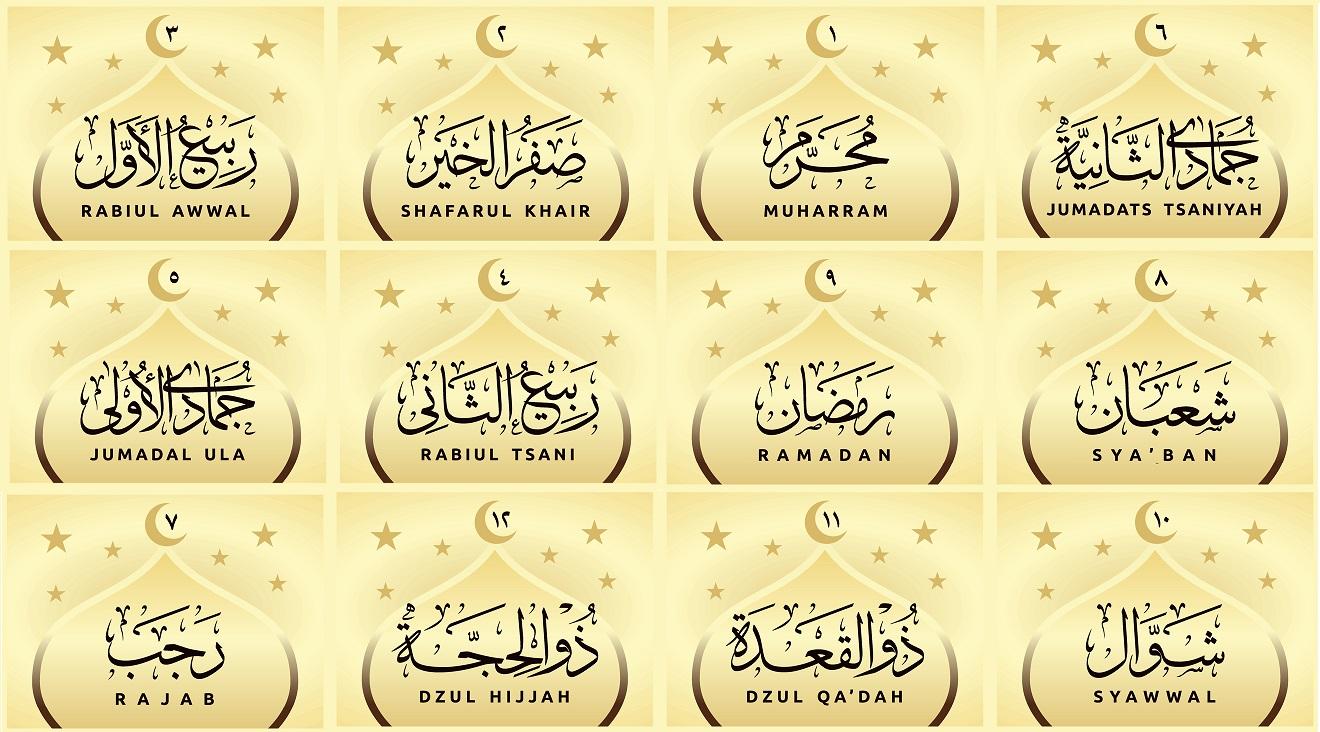
The Islamic calendar differs from the Gregorian calendar because it follows the cycle of the moon rather than the cycle of the sun, but the two calendars have one thing in common: they both have 12 months. The 12 Islamic months each have different meanings, with four of them being sacred months during which fighting and conflict is forbidden.
There is a rich history behind each of the months which is both symbolic and deeply interesting, so if you want to learn more about the meaning of Islamic months, keep reading.
Muharram
The first month in the Islamic calendar is MuharramMuharram is the first month of the Islamic calendar. It is one of the four sacred months of the year when warfare is banned. It precedes the month of Safar. The tenth of Muharram is known as Ashura, an important day of commemoration in Islam. More and it translates from Arabic to ‘forbidden’. Its name relates to the fact that it is the first of the four sacred month during which fighting is haram. It is sacred so that Muslims can return from Hajj without being attacked. There are a number of notable events that took place during MuharramMuharram is the first month of the Islamic calendar. It is one of the four sacred months of the year when warfare is banned. It precedes the month of Safar. The tenth of Muharram is known as Ashura, an important day of commemoration in Islam. More, with the most significant being the Day of AshuraThere are certain days in the year which are more virtuous than others, one such day is the 10th of Muharram which is known as the Day of Ashura, falling in the first month of the Islamic lunar calendar. It is believed the Day of Ashura commemorates various historical events, including the day when Prophet Moses (Musa) and the Israelites were saved from the tyranny of Pharaoh in Egypt. Prophet Muhammad (SAW) observed the Jews fasting on this day to commemorate their deliverance, and he recommended Muslims to also fast. The Prophet (SAW) said: “We are closer to Musa than you are,” and advised Muslims to fast ‘Ashura’ either for three days (ninth, tenth, and eleventh); two days (ninth and tenth); or just the day of Ashura itself. In Islam, Ashura is a solemn occasion, as it marks the martyrdom of Imam Hussein ibn Ali, the grandson of Prophet Muhammad, along with his family members and companions, in the Battle of Karbala in 680 CE. More which occurs on the 10th day.
Safar
The second month is called Safar. The translation means ‘void’, and there are two possible reasons for this. Some believe the name comes from the fact Arab homes were empty at this time of year because everyone was out finding and gathering food. In contrast, some people believe that the meaning of the month comes from tales of Arabs looting the homes of their enemies post-battle. Several battles were fought during Safar, and in an effort to cement Islam as a peaceful religion, Allah (SWT) commanded the Muslims move to Medina during Safar to avoid any further conflict.
Rabi al-Awwal
The third month in the Islamic calendar is called Rabi al-Awwal and it is an extremely joyous month. It translates to ‘the first spring’ or ‘to graze’, as this was when cattle began grazing as the earth sprouted with new life. The most prominent event during Rabi al-Awwal is the birth of Prophet Muhammad (PBUH) in 570 A.D. Many Muslims celebrate his birth, but they also grieve for him as it was also during Rabi al-Awwal that he passed away and returned to Allah (SWT) in 632 A.D.
Rabi al-Thani
Rabi al-Thani is the fourth Islamic month in the calendar and means ‘the second spring’. There are a number of different events that took place in this month, but for many Muslims, it is a time for mourning. Fatimah bint Musa, the daughter of the seventh Twelver Shia Imam, Musa al-Kadhim, and Sufi sheikh, Abdul-Qadir Gilani, both died during Rabi al-Thani.
Jumada al-Awwal
Jumada al-Awwal is the fifth month of the year and it translates to ‘the first parched land’. It’s thought that historically Jumada al-Awwal was the first month of summer pre-Islam, but some people believe it means ‘to freeze’ and relates to frozen weather causing parched land.
Jumada al-Thani
The sixth month of the Islamic calendar is Jumada al-Thani which means ‘the last parched land’. It is a significant month within the calendar, but different sects of Muslims celebrate it for different reasons. Fatimah al-Zahra, Prophet Muhammad (PBUH) and Khadijah’s youngest daughter, was born during this month, and she also died during this month. Caliph Abu Bakr passed away during Jumada al-Thani, making this a month of mourning for many.
Rajab
Rajab is the seventh month of the Islamic calendar and translates to ‘respect’ or ‘honour’. It is the second of the sacred months and therefore it is haram to fight or engage in conflict during this time. Rajab is considered Allah’s (SWT) month and is therefore a highly significant time during the year. It’s believed the Creator designated Rajab as a sacred month so that Muslims could complete the voluntary pilgrimage, Umrah, without being attacked.
Sha’ban
The eighth month of the Islamic year is called Sha’ban and is considered the month of Prophet Muhammad (PBUH). It is sometimes referred to as the neglected month because Rajab precedes it and Ramadan comes straight after it, but it is an important month nonetheless. Sha’ban means ‘scattered’ and relates to the time of the year when Arabs would historically scatter to find water. Nowadays, many Muslims use Sha’ban to prepare for Ramadan.
Ramadan
The ninth month of the Islamic calendar is one of the most prominent and is well known outside the Muslim community, too. Ramadan means ‘burning heat’ because it historically fell during a hot time of the year. Muslims observe Ramadan by fasting from dawn to dusk in order to cleanse their minds, bodies, and souls, and to be reminded of the fortune Allah (SWT) has bestowed upon them. Fasting gives Muslims an insight into what their lesser fortunate brothers and sisters go through when hungry.
Shawwal
After Ramadan comes the 10th month of Shawwal, which means ‘raised’. The meaning of the name relates to the fact that female camels are normally pregnant at this time of year. Shawwal is a celebratory month, with Eid al-Fitr taking place from the first to the third day. Lots of food, gifts, and prayers are exchanged during Shawwal, with many praying that their Ramadan is accepted by Allah (SWT).
Dhul al-Qadah
The 11th month of the Islamic calendar is Dhul al-Qadah which means ‘the month of truce’. It is the third sacred month during which Allah (SWT) forbids violence so that Muslims can make their way to Mecca to commence their Hajj safely. It is special because Allah (SWT) said so, and like the other sacred months, good and bad deeds are weighted more heavily at this time.
Dhul Hijjah
The final month of the Islamic year is the holiest and most significant of all. Dhul Hijjah means ‘pilgrimage’ and relates to the fact that Muslims carry out their religious due of Hajj during this month. There are many significant days during this month, including the Day of Arafah when Allah (SWT) finalised Islam. Other key dates include QurbaniThe word “qurbani” means sacrifice in many languages, and the word “udhiya,” in Arabic, refers to the specific animal that is sacrificed on Eid ul-Adha. This sacrifice is made by the head of the household on behalf of the family. It can either be a sheep, goat, a portion of a camel or a portion of a cow More, the Festival of Sacrifice that honours Prophet Ibrahim (AS) and his devotion to the Creator. Following QurbaniThe word “qurbani” means sacrifice in many languages, and the word “udhiya,” in Arabic, refers to the specific animal that is sacrificed on Eid ul-Adha. This sacrifice is made by the head of the household on behalf of the family. It can either be a sheep, goat, a portion of a camel or a portion of a cow More is Big Eid, also called Eid al-Adha – a time for great celebration and joy. Dhul Hijjah is the fourth and final sacred month so that Muslims can complete Hajj in safety.
Make the Most of the Months
There are many different opportunities for you to make the most of the Islamic months, with the option to donate ZakatA tax that is the duty and social obligation of every Muslim. This as the fourth Pillar of Islam. More at any time of the year. You can also offer dua during the sacred months, make charitable donations throughout the year, and give Sadaqah Jariyah at any point and reap the rewards from Allah (SWT).
Post Disclaimer | Support Us
Support Us
The sailanmuslim.com web site entirely supported by individual donors and well wishers. If you regularly visit this site and wish to show your appreciation, or if you wish to see further development of sailanmuslim.com, please donate us
IMPORTANT : All content hosted on sailanmuslim.com is solely for non-commercial purposes and with the permission of original copyright holders. Any other use of the hosted content, such as for financial gain, requires express approval from the copyright owners.
 Sri lanka Muslims Web Portal Sri Lanka Muslims News Center
Sri lanka Muslims Web Portal Sri Lanka Muslims News Center
 Donate
Donate


